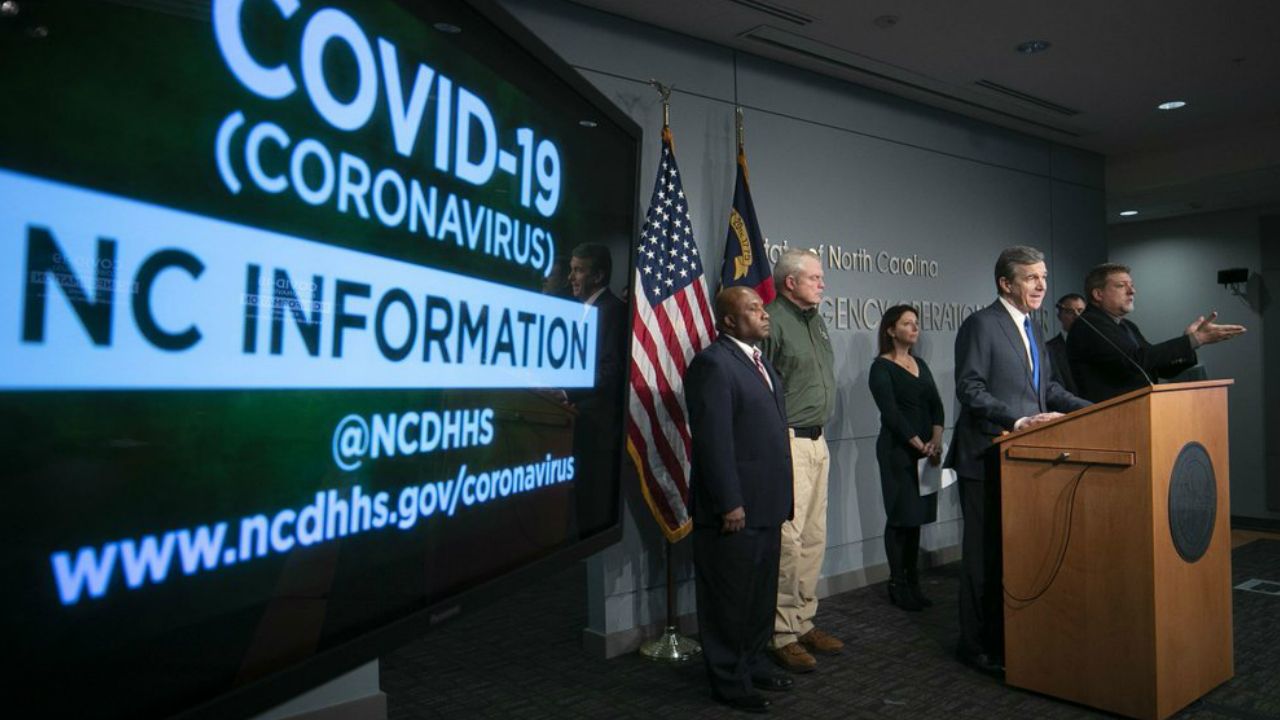RALEIGH, N.C. (AP) — North Carolina Gov. Roy Cooper on Monday announced the extended shuttering of K-12 schools until mid-May as well as tighter assembly and business restrictions, seeking to combat the spread of the new coronavirus.
- Schools will now remain closed until for in-person instruction until May 15
- Executive order now makes assemblies of 50 or more people a misdemeanor
- Hair salons, barbershops, gyms, movie theaters, and similar businesses added to the list of mandatory closures
Cooper issued a new executive order that, starting late Wednesday, would make it a misdemeanor for there to be assemblies of more than 50 people, compared to the current prohibition of over 100. The 50-person limit is in keeping with previous guidance from health officials. President Donald Trump also has urged avoidance of gatherings of more than 10 people.
Cooper’s order also will direct that by 5 p.m. Wednesday all hair salons, barbershops, gyms, fitness clubs and movie theaters must close, as well as similar business activities that run counter to social distancing. Bingo parlors, bowling alleys, tattoo parlors also are on the closure list. Across North Carolina, restaurants and bars can continue to remain open only for delivery or take-out meals. Grocery stores also continue to operate.
Public schools statewide will now remain closed for in-person instruction until May 15, Cooper said. He had already ordered closings of at least two weeks beginning March 16.
“I know that these actions cause hardship and heartache for a lot of people, but they’re necessary to save lives,” Cooper said at a news conference.
Cooper said he wasn’t giving up yet on returning to class to complete the public school year. State education officials and lawmakers are working on plans to expand online instructional assistance beyond virtual efforts already underway. Universities already have shifted to online instruction.
“We can’t treat this as a long break,” Superintendent of Public Instruction Mark Johnson said, adding that his daughter’s first-grade class had a video call with their teacher on Monday. He urged parents to keep their children on a schedule that includes a few hours of daily instructional time. His department has assembled distance-leaning options. Johnson said high school seniors will still be on track to graduate in June. Cooper said plans also include ensuring school employees keep getting paid during this suspension.
As of Monday morning, state health officials counted nearly 300 positive COVID-19 cases, an increase of more than 40 compared to Sunday. No deaths have been reported, although about a dozen people are hospitalized. Mecklenburg, Wake and Durham cases account for over half of the total.
For most people, the virus causes mild or moderate symptoms. But for older adults and people with existing health problems, it can cause more severe illness, including pneumonia.
In the effort to ensure children in low-income families have enough to eat during the school closures, the state’s 115 school districts, helped by food banks, churches and volunteers, had served 1.2 million meals and 6,500 snacks through Sunday, Cooper’s office said.
The State Board of Education agreed earlier Monday to seek an exception to federal K-12 testing and accountability requirements this year. Board Chairman Eric Davis said he was talking with state legislative leaders about how to eliminate public school accountability mandates specific to North Carolina. The legislature convenes in late April, and Cooper said broader requests for state lawmakers — potentially in a special session — would flow based on gaps in any upcoming congressional funding deal.
Limits on commerce, including the prohibition on dining-in at eateries and bars, has led to a massive number of unemployment claims in North Carolina. The Division of Employment Security said Monday it had processed 113,000 claims between March 16 and Monday morning, compared to 3,500 on a usual week in recent months. Seven out of every eight claims have been related to COVID-19 displacement. People could file claims for layoffs or reductions in hours due to the virus.
Cooper’s office said that federal emergency officials have received his request for a major disaster declaration, akin to what a North Carolina governor seeks after a major hurricane to obtain additional federal financial assistance.
While state and local movement restrictions haven’t halted outdoor exercising for individuals, access to dedicated places for recreation continue to diminish.
A half-dozen state parks are now completely closed, including Hanging Rock in Stokes County and Crowders Mountain west of Charlotte. Campgrounds in all North Carolina national forests closed on Monday through at least mid-May.
Great Smoky Mountains National Park, which straddles the North Carolina-Tennessee border, shut down campgrounds, picnic areas and restrooms through the end of April.



